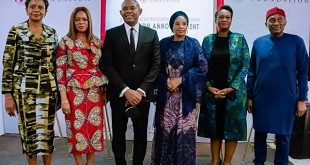
How can African countries increase tax revenues to fund their budgets and reduce donor dependency? This is the general question that African countries have dealt with over the years in response to the growing demand for services by the population.
Kampala, Uganda | JULIUS BUSINGE | At the 4th international conference on tax in Africa organized by Africa Tax Administration Forum (ATAF), a grouping of 38 countries held at Serena Hotel from Nov.19-22, tax experts agreed they would find ways to answer this question.
The conference was attended by about 300 people from the member countries and was hosted by the Uganda Revenue Authority (URA) under the theme ‘innovation-digitalization and harnessing technology to improve tax systems.’
Doris Akol, the commissioner general at Uganda Revenue Authority (URA) said, there are several transactions that online companies are making with their clients, making money out of them, but are not remitting taxes to governments.
“While we celebrate all these great achievements (as ATAF), we are cognisant of the fact that there are challenges that we need to address – the digital economies…for example Jumia, Google adverts, Facebook adverts, Kikuu are around us…we have all used them in a way or another, and yet we are not registering revenue numbers in terms of collections from them,” she explained.
Akol attributes this to loopholes in government’s policies which she said overlooked the power of a digital economy.
She explained that for one to be assessed for tax, they must have a physical address, which is a pre-requisite that does not tally with digital economies because they operate online and barely have a physical footprint, yet they mint lots of money in sales.
“So as we kick off the 4th International Conference on Tax, we shall centre efforts on innovative ways to handle this sector and harness technology to improve our tax systems,” Akol said.
Going forward, Akol said, the ICTA resolutions will inform the global tax debate over the next decade. She said that digitization addresses integrity/ethical issues that come up in tax administration.
The experts would also use the conference to look at innovation through use of technology in Africa to strengthen tax systems and develop solutions to broadening the tax base, dealing with high net worth individuals, assessment and collection among others so as to increase tax efficiency and effectiveness.
African Tax Outlook 2019 by The Independent Magazine on Scribd
ATAF has played a key role in the global tax agenda over the last decade and became a key player in the Inclusive Framework and the UN Committee of Experts.
The platform gained significant regional and international visibility as they promoted African perspectives on tax issues and represented the views and interests of its members.
It has provided technical assistance and capacity building to member states through various international taxation programs such as cross-border taxation, VAT technical committee, legal counsel network and the exchange of information technical committee. In addition, ATAF has trained over 15,000 officials in international tax and several tax administration matters such as tax treaties, transfer pricing, tax audit and taxing natural resources.
One of the areas ATAF has set a mark is in helping African countries curb illicit financial flows through her Double Taxation Agreement, officials said.
Many African countries, Uganda inclusive, have been dealt a raw deal from unscrupulous DTAs used by companies to rip developing countries of huge sums of money, according to Akol.
The experts at the meeting said Africa is currently losing about $80billion annually through illegal financial flows which hinder economic growth and related opportunities.
Illicit financial flows are illegal movements of money or capital from one country to another through tax evasion, money laundering and smuggling, among other avenues.
Finance Minister, Matia Kasaija said that the government of URA would work with ATAF experts to design tools to aid tax collection arising from online transactions. He cited hotels that are booked and paid for online, cryptocurrency that is slowly becoming popular and other online purchases that are done without the eye of the taxman.
The Executive Secretary for ATAF, Logan Wort said that digital platforms and the supply of digital intangibles has produced a mixed bag of risks, as well as opportunities for revenue enhancement and mobilization. He said that it provides an opportunity to take advantage of digital intelligence in order to police and encourage tax compliance.
“In equal measure, the growth of this sector has occasioned new, decentralized forms of currency which are no longer linked to or regulated by central banks. All this impacts tax collection in different ways hence the need to debate these and rethink how best to benefit from this,” he said.
President Yoweri Museveni, who officially opened the conference, said that Kasaija and the experts needed not to worry because whoever conducts business online can easily be traced.
He however said that, what is important now is for African governments to tax consumption (especially for luxury goods) and not production so as to stir economic growth.
****
About ATAF
The African Tax Administration Forum (ATAF) was formed after a Pretoria conference on taxation and state building. The key objective for its launch was the need to take control of the continent’s development by mobilizing revenue internally. Africa was ravaged by the 2008 global economic crisis and the level of foreign aid and direct investment fell significantly. ATAF was then birthed as a beacon of hope to strengthen revenue mobilization and administration in the continent.
 The Independent Uganda: You get the Truth we Pay the Price
The Independent Uganda: You get the Truth we Pay the Price


